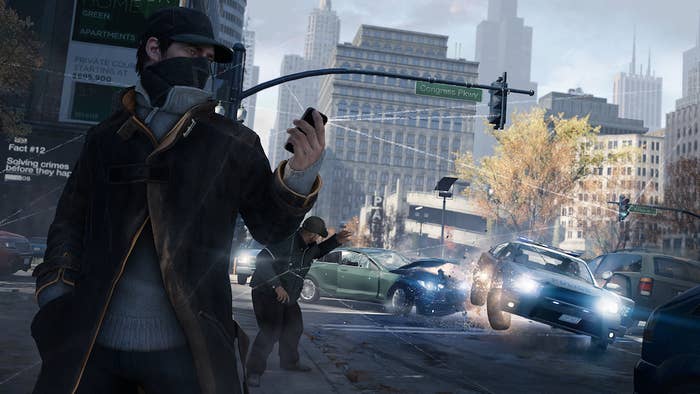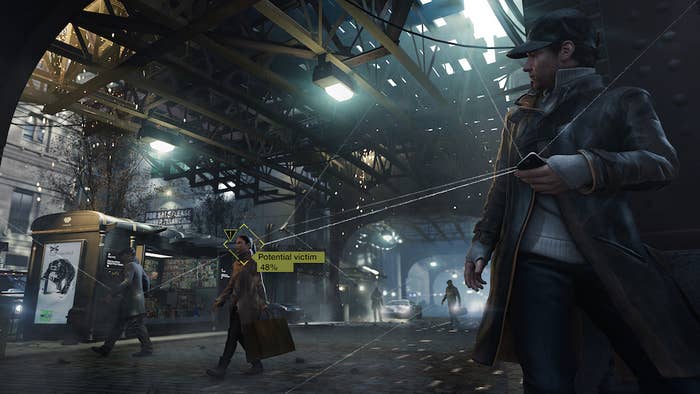
When Grand Theft Auto IV came out in 2008, some carped about Rockstar's inclusion of a fictional internet in the game world. People play sandbox action games to act out their various antisocial fantasies, the argument went, not to engage in the virtual mundanities of their sedentary lives. Rockstar pulled it off, as Rockstar tends to do, because of its sense of humor, and then we all sort of forgot about it. I don't think anyone really stopped to imagine what a game structured around the mechanics of digital living would actually look like.
That's Watch Dogs, the sandbox game coming this November from Ubisoft. I saw the game demonstrated yesterday, on a high-end PC that was "very close to the specs of a PlayStation 4," according to the coy demonstrator. And for better or worse, I can report that this game is not, as I admit I expected, Grand Theft Auto with a patina of technophilia/phobia/what-have-you. This is a game that is steeped in the logic and implications of a networked society. In part of the demonstration that we saw, your objective is literally to gain access to a heavily fortified municipal server room, so you can hack it to gain access to the smart phones of the locals. How you can do this: by shooting. How you can also do this: by taking remote access of the server's various "smart" electronics (gates, elevators, cameras) to distract, confuse, and surveil security.
Now, that's not totally novel, but given the fact that you play the game as a master hacker, it feels logical and consistent with the game's fiction. The possibilites of this open world all come out of the information you get by spying on characters in the game: if they have their bank information saved on their phone, you can empty their checking account at an ATM; if they have a conversation about going to do X or Y or Z interesting thing, you can eavesdrop and then prevent them from doing X or Y or Z. (And of course, because this is a game, everyone you spy on seems to be either a drug dealer, rapist, loan shark, or sex-doll-haver. But I digress.)
Watch Dogs is also just clearly of internet culture, and not in the superficial, look-we-know-about-memes way. Like, there is an actual virtual-virtual augmented reality game, played on the main character's video game phone, which simulates an alien invasion of the game world. And your character can identify ambient music with a Shazam-like app and then reprogram places in the game world to play it.
This all makes Watch Dogs feel very of the moment, which is kind of amazing when you consider the length of game development cycles. When Watch Dogs began its development, in the spring of 2009, Barack Obama had just been inaugurated, The Hangover was about to come out, and "big data" was still a year or two away from being the ubiquitous buzzword that it is today.

This may also be the first game to contain an actual structural criticism of the always-on, always-sharing trajectory of the medium (which, to my mind, is a much richer seam than the endless, and largely cosmetic "criticisms" in-game criticisms of violence). Given the dedicated "share" button on the new PlayStation controller (with which an Ubisoft rep played the game yesterday) and the mandatory connectivity rumors about the new Xbox, it feels like Watch Dogs is coming at the right time.
It's also kind of refreshing to see a game in which the central power fantasy is not gun-related. Dominic Guay, a senior producer, told me that the development team actually considered making Watch Dogs without the player ability to shoot guns. Considered: baby steps. Of course, if this was a realistic game about hacking, Aiden Pierce (the protagonist) would spend most of his time taking over corporate Twitter accounts and mounting denial of service attacks against defenseless websites.
And then there's Chicago, which has been inexplicably ignored for decades by games. Between the world-famous architecture, the dramatic river crossings, and the double-decker streets downtown (which were used to such memorable effect in The Dark Knight), Chicago almost feels, as Guay told me, "like it was built by a game designer." As someone who spent years of his life in the City of the Big Shoulders, it was immensely gratifying to see a car chase from the South Side, up Halsted, over the Halsted Bridge, and into the Loop. Of course, if this was a truly realistic game about Chicago, an eavesdropping white man in a trench coat in the Back of the Yards would probably not go unmolested.
And Chicago looks just a little better than it did in Midtown Madness. This is a PS4 launch game, and it looks impressive, if somehow not as staggering as the E3 video from last year. The things that are supposed to gleam, gleam. The things that are supposed to ripple, ripple. I see no good reason not to wow your non-gamer friends with it.
Watch Dogs will inevitably be compared to the fall's 800-pound gorilla, Grand Theft Auto V, and that's natural: They are both enormous, enormously expensive open-world shooting games with astronomical levels of publicity. That seems like a fight that Ubisoft — and every other game company in the world — would want to avoid. But this is a much, much weirder and more interesting game than I thought it would be, and one that is sufficiently different from Rockstar's rockstar that I would not count it out.
